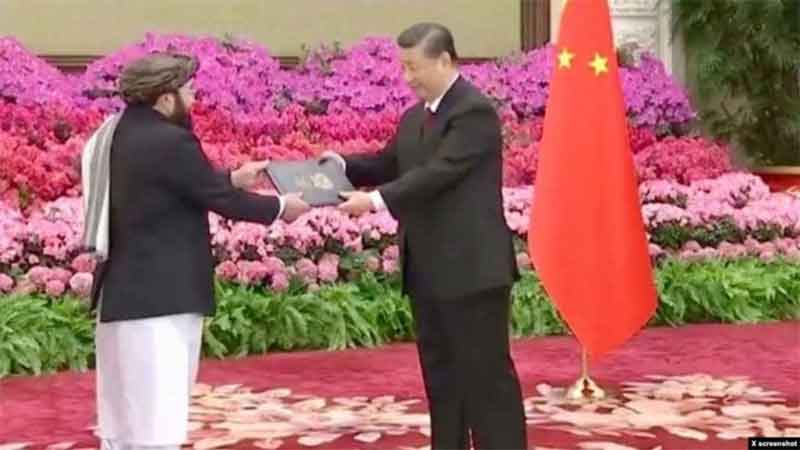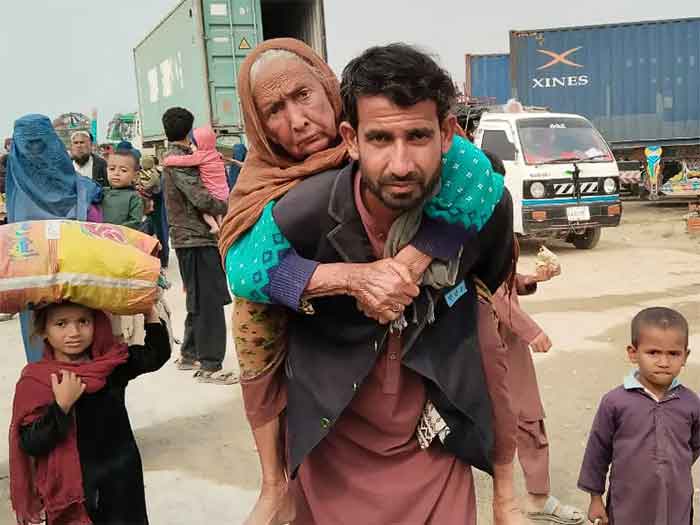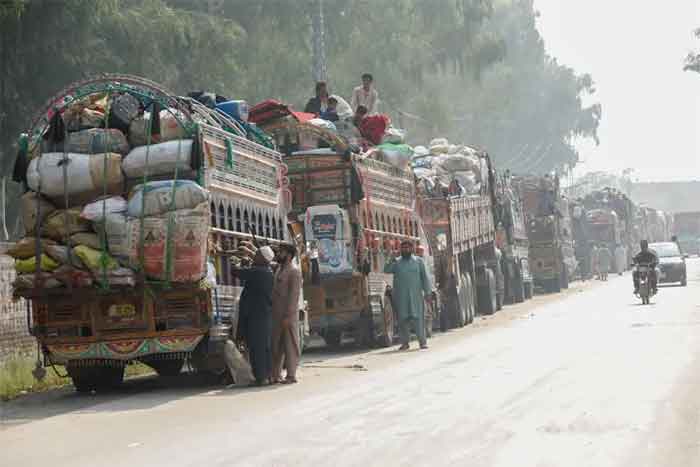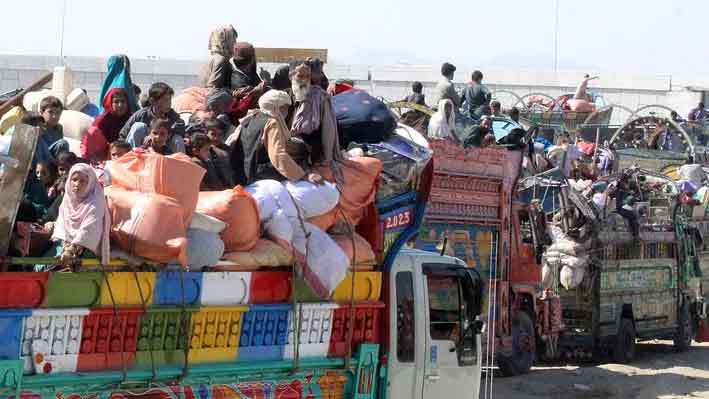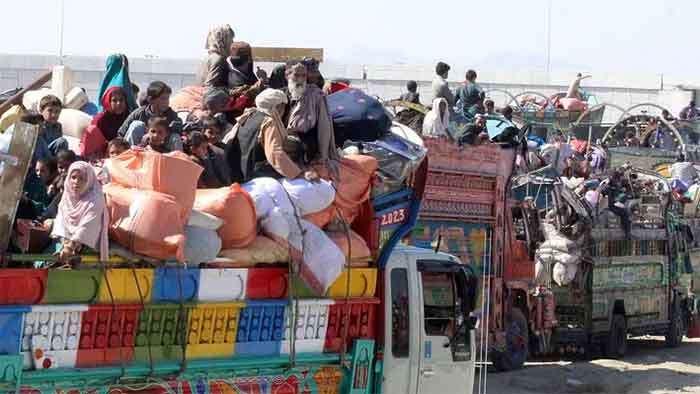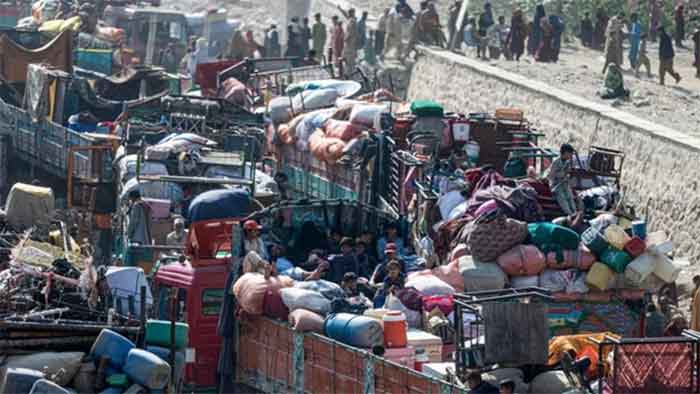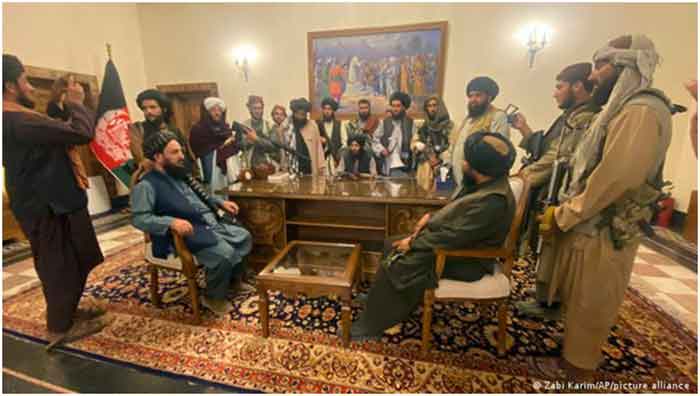
Mullah Nooruddin Turabi, a co-founder of the Taliban who will control prisons under the new regime in Afghanistan, said strict punishment, including amputations and executions, will return.
“Everyone criticized us for the punishments in the stadium, but we have never said anything about their laws and their punishments,” Turabi said in Kabul during an interview, which was published Thursday by the Associated Press. “No one will tell us what our laws should be. We will follow Islam, and we will make our laws on the Quran.”
Under the Taliban’s previous rule of Afghanistan, Turabi served as justice minister and head of the so-called Ministry of Propagation of Virtue and Prevention of Vice, a position the Associated Press stated was “the religious police.” During that time, amputations and executions were carried out for criminal offenses, including theft and highway robbery.
According to Turabi, those same practices will be brought back.
“Cutting off of hands is very necessary for security,” Turabi said, claiming it was a deterrent to theft and other crime.
While it has yet to be determined whether the punishment will occur in public, Turabi said that Taliban officials are working to “develop a policy” to handle it and insisted the Taliban “are changed from the past,” as he spoke with a female reporter.
TV, Mobile Phone, Photo, Video Allowed
In addition to announcing that severe punishments would return, Turabi, said the Taliban would allow television, mobile phones, photos and videos “because this is the necessity of the people, and we are serious about it.” He also noted that female judges would be allowed to adjudicate cases. However, Afghanistan’s laws will be based on the Quran.
Turabi even claimed it would help spread the Taliban’s message.
“Now we know instead of reaching just hundreds, we can reach millions,” he said, adding that if executions and amputations are approved for public viewing, then people could record those instances and share them as a deterrent for what Taliban officials consider criminal offenses.
Christians, Religious Minorities in Afghanistan Face Greater Danger under Taliban Rule
The highly criticized U.S. withdrawal from Afghanistan leaves local Christians and many other religious minority groups fearful following the Taliban takeover of the country.
Before the Taliban took control over Afghanistan, the country ranked second on an annual report of countries where Christians face the most extreme persecution released by Open Doors.
The international NGO advocating on behalf of persecuted Christians, also found that there was a 60% increase globally of Christians being killed for faith related reasons in 2020 up from 2019.
The March for the Martyrs, the first large-scale march in U.S. history to stand in solidarity with Christians around the world, will be hosted in the nation’s capital this year. The march, hosted by For the Martyrs, has moved from Long Beach, California, amid the current situation in Afghanistan to raise further awareness.
The founding president of For the Martyrs, Gia Chacon, told that it could not be better timing that the march will be held in D.C., sharing “everyone’s been paying attention to what is been going on in Afghanistan … the reports of Christians who are now hunted down … killed for their faith.”
Killed for Bible on Phone
“We have heard reports of Christians who have been killed just for having a Bible on their phone and pastors being sent messages, warnings from the Taliban to cease operations from their home churches. Christians who are already under threat in Afghanistan are now facing an increase of violence and will continue to face this increase of violence in the country,” shared Chacon.
Speakers at the event include survivors of Christian persecution, important leaders and strong Christian figures.
Worried about being tracked, Christians are turning off their phones and moving in case the Taliban has the technical capabilities to monitor them, The Hill reported.
Former ambassador Sam Brownback, who was the former ambassador at large for International Religious Freedom, will be sending a special message to March attendees.
He told that he right now there is the “highest level of Christian martyrdom in the history of Christendom. We really should be standing up for them more, even whether you’re a person of faith or not. These are people that are being persecuted simply for peacefully practicing their faith and they’re dying for it.”
Brownback shared that what is happening in Afghanistan is unfolding right before our very eyes in real time. He adds, “For the Christian community it’s horrible. I want to say it was livable when we were there and now it’s just become deadly.”
Speaking on the future oppression of religious minorities, Brownback shared that it “is going to be high tech. It will be a virtual police state. It will be facial recognition cameras. It will be you excluded from practicing your faith or else you won’t be able to use your currency, if they are able to digitize their currency.”
“If we do not get these people out, it will be a genocide” shared the former ambassador.
Over a thousand attendees are expected at the march, bringing “all ages and all denominations of Christianity … together as one voice for the persecuted church,” said Chacon.
She hopes the event will catch the attention of those in Congress and the White House. She says they will continue to host the March for the Martyrs in Washington, D.C.
Do not let Taliban Fool You: Women’s Rights Activist at UN
Afghan rapper and activist, Sonita Alizadeh, fled her homeland with her family when it was last ruled by the Taliban more than two decades ago – when women could not work, had to cover their faces and girls were banned from school.
She urged world leaders on Tuesday to stand up for the rights of women and girls now the Taliban had returned to power.
“What will remain of our people? And what will remain of the 20 years of achievements? Do not be fooled by the masks the Taliban show on the news,” Alizadeh told a virtual event on the sidelines of the annual high-level UN General Assembly.
“We have no time,” she pleaded.
She urged the international community not to recognize the Taliban, guarantee the rights of women and children, ensure internet access for the Afghan people, include more Afghans in decision making and keep girls in school.
“It looks like we all know what must be done. But the question is that, who will take action today?” Alizadeh said.
“There is real and palpable fear among Afghan women of a return to the Taliban’s brutal and systemic repression of women and girls during the 90s,” UN human rights chief Michelle Bachelet told the same UN event on Tuesday.
The Taliban stirred skepticism about their pledges on the rights of women and girls when they said last week that they would open schools for high school-aged boys but not girls.
U.N. Secretary-General Antonio Guterres said last month the Taliban’s desire for international recognition is the only global leverage to press for inclusive government and respect for rights, particularly for women, in Afghanistan.
The Taliban is the key player that shows disregard for humanity every direction it looks, as in beating up people in Kabul for not wearing Taliban-approved clothing. They flogged a woman in the street for talking to a man.
Protesters of such tyranny have confronted gunfire as a counter-argument, and people are terribly scared, as was dramatically demonstrated by those clinging to the outside of airplanes to escape. Prices are unpayable, homelessness is rampant, cross-border trade has gone “poof”, according to the New York Times.
The Times reported on donors being wary of “brutality” and “human rights abuses.” The aim, however, is for the UN to be handling the humanitarian assistance, not the Taliban.
Look who’s defending the rights of Afghan women
The Christian Science Monitor editorial board wrote on September 23, 2021:
Since taking power five weeks ago, the Taliban have not put gender equality high on their priorities in Afghanistan. No woman sits on the interim Cabinet, for instance. Girls are barred from high school. Yet in coming weeks as the country faces emergency levels of hunger, the Islamic group could see the rights and roles of women in a new light.
One by one, foreign aid groups with long histories of working in Afghanistan are insisting on clear guarantees for their female Afghan staff to work freely in delivering goods and services, especially to other women. From the Norwegian Refugee Council to CARE International, relief groups have set a red line for gender rights.
“If women are prevented from delivering humanitarian services, we become complicit in the entrenching of gender inequality,” says Anita Bhatia, deputy executive director of United Nations Women. For his part, UN Secretary-General Guterres told the Security Council that aid must be delivered “without … discrimination.”
This principled stance by the humanitarian aid community reflects three decades of work to shift global thinking about women’s rights. It also reflects faith in Afghan women to insist on the rights and freedoms they enjoyed under nearly two decades of democracy.
The Taliban are definitely listening to the international community, Pakistani foreign minister Shah Mahmood Qureshi told The Associated Press. “Yes, there are no women yet [in the Cabinet],” he said. “But let us let the situation evolve.”
The Taliban already know they are failing. Only 5% of Afghans have enough to eat, according to the UN. As their forces took territory over the past year, millions of Afghans fled their homes. An estimated 80% of them are women and children.
While the Taliban may claim a legitimacy to rule by claiming to be unassailable religious scholars, their tenure could also depend on the informal consent of the Afghan people.
Besides foreign aid workers, the Taliban also need cash. Before they took power, Afghanistan thrived on about $8.5 billion a year in foreign assistance. Almost all of that has dried up. The U.S. has frozen $7 billion in Afghan foreign reserves held in New York.
In recent days, the UN has lined up $1.2 billion in donor pledges for aid to Afghans who face drought, hunger, and the pandemic. With most of those in need being women and girls, female aid workers will be essential in delivering that aid.
Both the world and Afghanistan’s roughly 40 million people have shifted on women’s rights since the Taliban last ruled in the 1990s. It will take persistent foreign insistence to shift the Taliban, too.
No al Qaeda or ISIS in Afghanistan, Claim Taliban
Afghanistan’s Taliban rulers said on Tuesday there was no evidence of Islamic State (IS or ISIS) or al Qaeda militants being in the country, days after IS claimed responsibility for bomb attacks in the eastern city of Jalalabad.
Since toppling the Western-backed government in Kabul last month, the Taliban have faced pressure from the international community to renounce ties with al Qaeda, the group behind the September 11, 2001, attacks on the United States.
At the same time, they have had to deal with a series of attacks claimed by an affiliate of IS, with which they have been in conflict for several years over a mix of economic and ideological disputes.
Taliban spokesman Zabihullah Mujahid rejected accusations that al Qaeda maintained a presence in Afghanistan and repeated pledges that there would be no attacks on third countries from Afghanistan from militant movements.
“We do not see anyone in Afghanistan who has anything to do with al Qaeda,” he told a news conference in Kabul. “We are committed to the fact that, from Afghanistan, there will not be any danger to any country.”
The Afghan affiliate of IS, known as Islamic State Khorasan (ISIS-K), after an old name for the region, first appeared in eastern Afghanistan in 2014 and later made inroads into other areas, particularly the north.
Several years ago, the U.S. military put the group’s strength at about 2,000 fighters, though some Afghan officials at the time estimated the number was higher.
It battled U.S.-led foreign forces and the Taliban, for control of smuggling routes while also apparently seeking to build a global Caliphate.
The group claimed responsibility for a series of bomb attacks in the city of Jalalabad in eastern Afghanistan at the weekend. It also claimed a suicide bomb attack at Kabul airport last month that killed 13 U.S. troops and scores of Afghan civilians who had crowded outside the airport gates.
Mujahid denied the movement had any genuine presence in Afghanistan though he said it “invisibly carries out some cowardly attacks”.
“The ISIS that exists in Iraq and Syria does not exist here. Still, some people who may be our own Afghans have adopted the ISIS mentality, which is a phenomenon that the people do not support,” he said.
“The security forces of the Islamic Emirate are ready and will stop them,” he said.
IS bomb attacks on Taliban raise specter of wider conflict
The IS has claimed responsibility for a series of deadly roadside bombs targeting Taliban in eastern Afghanistan, raising the specter of wider conflict between the country’s new Taliban regime and their long-time rivals.
A string of explosions struck Taliban vehicles in the provincial city of Jalalabad over the weekend, killing eight people, among them Taliban fighters. On Monday, three more explosions were heard in the city, an IS stronghold, with unconfirmed reports of additional Taliban casualties.
The Taliban are under pressure to contain IS militants, in part to make good on a promise to the international community that they will prevent the staging of terror attacks from Afghan soil. There is also a widely held expectation among conflict-weary Afghans that — despite fears and misgivings about the Taliban — the new rulers will at least restore a measure of public safety.
“We thought that since the Taliban have come, peace will come,” said Feda Mohammad, a brother of an 18-year-old rickshaw driver who was killed in one of Sunday’s blasts, along with a 10-year-old cousin.
“But there is no peace, no security. You cannot hear anything except the news of bomb blasts killing this one or that,” Mohammad said, speaking at the family home where relatives and neighbors gathered for a memorial ceremony, drinking black tea and reciting verses from the Quran.
The latest IS bombings come as the Taliban face the daunting task of governing a country shredded by four decades of war. The economy is in free fall, the health system on the verge of collapse and thousands of members of the country’s educated elite have fled. International aid groups predict worsening drought, hunger and poverty.
“Our misery has reached its peak,” Abdullah, a shopkeeper in Jalalabad, said Monday, a day after IS claimed responsibility for the bombings that rocked the city the two days before.
“People have no jobs, people sell their carpets to buy flour … still there are explosions and (IS) claims the attacks,” said Abdullah, who like many Afghans goes by one name.
The weekend bomb blasts served as a reminder of the threat the militants pose.
The events have bolstered fears of more violence, as IS militants exploit the vulnerability of an overstretched Taliban government facing massive security challenges and an economic meltdown.
“They’re making a very dramatic comeback,” Ibraheem Bahiss, an International Crisis Group consultant and an independent research analyst said of IS. “There could be a long-term struggle between the groups.”
For now, the Afghan affiliate of IS has shied away from attacks against the West and maintained a local focus, but that could potentially change, Bahiss said.
The aims of the IS affiliate in Afghanistan are different from those of the Taliban, who seized control of the country days before the U.S. troop pullout last month. While the Taliban have fought to gain ground in Afghanistan, the IS chapter seeks to incorporate swaths of the country into a broader self-styled caliphate, or Islamic empire, across the Middle East.
The franchise, largely made up of Pakistani militants pushed across the border by military operations, first embraced the IS call for a worldwide jihad against non-Muslims in the months after the group’s core fighters swept through Syria and Iraq in the summer of 2014.
While they share enmity toward the U.S. forces and a harsh interpretation of Sunni Islam, the Taliban and IS are sworn enemies. Just as the Taliban battled U.S. coalition troops in the long Afghan war, the group also waged a successful offensive to drive IS militants from their enclaves in the country’s north and east — at times assisted by the U.S. and U.S.-backed Afghan government.
Despite years of U.S. airstrikes and other military setbacks that shrank IS ranks, the UN reported this year the group “remains active and dangerous,” a threat to Afghanistan and the wider region. The affiliate has mounted some of the country’s most brutal attacks in recent years on schools, mosques and even a maternity hospital, mainly targeting the Shiite Muslim minority.
The affiliate has increasingly drawn hard-line Taliban defectors and foreign militants disillusioned with what they see as the Taliban’s overly moderate ways.
The New York-based Soufan Center said in an analysis on Monday that the franchise poses “one of the most serious risks to future splintering of the Taliban … at a time when the group is seeking to gather strength and play a major spoiler role in Afghanistan.” As a power struggle between pragmatists and ideologues in the Taliban leadership intensifies, the IS branch has ramped up recruiting efforts.
For now, Taliban forces far outnumber IS militants and experts doubt the extremist group poses an existential threat to Afghanistan’s new rulers. But if the bombings continue, said Franz Marty, a Kabul-based fellow at the Swiss Institute for Global Affairs, “it could become a large problem.”
“It is impacting people’s perceptions. If the Taliban cannot make good on their promise on securing the country, that could turn the tide of public sentiment against them in the east,” he said.
But in Jalalabad, the grief-stricken father of the 10-year-old boy killed in Sunday’s blast described the recent attacks as an ominous portent.
“We live in poverty and we don’t have security, either,” said Zarif Khan. “Today, my son lost his life, tomorrow others’ sons will lose their lives.”

